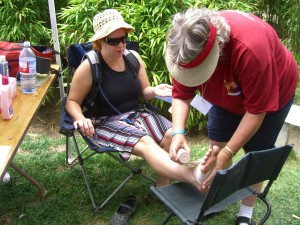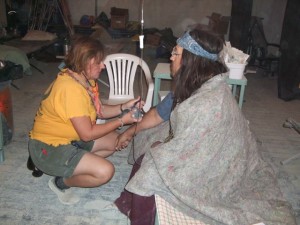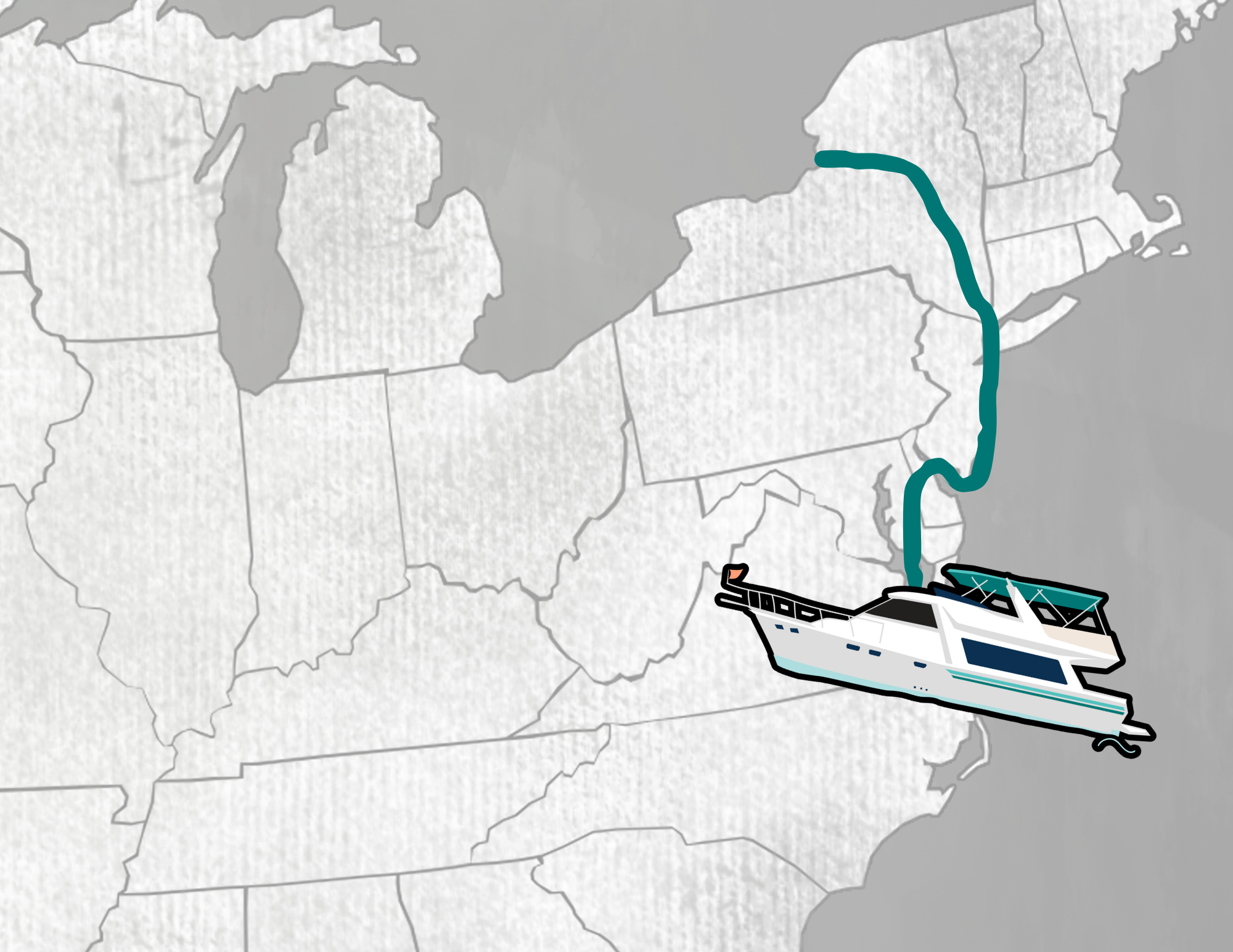No matter how you look at it, healthcare, and specifically health insurance, is a headache.
Despite this being one of the most substantial excuses that hold people back from a nomadic life, I’ve been holding off on posting about this topic for a couple of reasons.
For one, it took me nearly two years to figure out a workable solution for myself. And I’ve worked in healthcare software development for over 15 years – so I know more than most about how the system works! This stuff isn’t easy.

And secondly, I was waiting to see what the ultimate impact of the healthcare reform debate would be. And while I am thrilled with the upcoming shift around pre-existing conditions, most of the actual changes are years away from going into effect.
Things may be getting better, but securing affordable quality health care remains a challenge. This challenge is magnified for the self-employed, and for people without a fixed home. No wonder that healthcare is a particular problem for nomads!
The healthcare problem for nomads

The US healthcare system built up upon locally negotiated contracts between insurers and providers, and there is nothing close to any sort of unified system accessible nationwide. Many healthcare plans don’t even cross regional state lines due to different accreditation processes and regulations that vary from state to state.
I don’t care what your leaning is on the whole healthcare debate is – this localization presents a unique problem for full time travelers. Under most plans, this means that you will spend a lot of time ‘out of network’ simply because your travels take you away from where your plan was underwritten.
Many travelers are also self-employed, and thus ineligible for the sorts of large group plans that are often provided with more traditional jobs. If you’ve been insured most of your life via a group plan through your or a family member’s employment – you may not have ever needed to deal with the hassle of seeking out private insurance on your own. Large group plans provide some substantial advantages over individual plans, such as coverage for pre-existing conditions from day one – as long as you’ve been insured without lapse. Also, larger plans have a lot more clout that significantly reduces costs, and a member of a large group is less likely than an individual to have the insurer fighting against them to deny benefits.
Thankfully, the healthcare reform bill will do some to make things easier for the self employed and others on individual plans.
Access to affordable healthcare is a top reason why so many people legitimately feel they can’t leave their corporate jobs.
If you’re considering going nomadic and are able to take your existing “big company” career with you – look closely at your group plan options. Unless you work for a company that supports workers in many locations, most of the plan options are likely to be regionally based. This is especially true with the more affordable group plans, such as HMOs. If you have a PPO or indemnity option, you may be better off choosing it to at least have some access to out-of-network providers. Even still, you may find that your company simply doesn’t offer insurance options suitable for a traveling lifestyle – and you too will be out shopping for insurance.
My headache
I’m sharing my healthcare insurance story to demonstrate just one possible set of challenges. It’s nowhere near representative of all situations you might encounter, but I think my personal story illustrates several of the real-life snafus one can run into.
My parents and I have run a small software business for many decades. We have a group HMO health plan in Florida that provides fairly excellent care, although as my parents have aged the premiums have become ridiculous. Small business group plans generally are much more expensive than large group plans for equivalent benefits.
When I decided to go nomadic, I did so knowing that our group plan only provided me with emergency and urgent care coverage while away from Florida. Anything ‘routine’, or even aftercare for an emergency, would only be covered in our one “home” county in Florida.
This was an awful plan for a full-time traveler, but as a really small family business, if I left the plan it would have jeopardized our group status.

Changing to another group plan entirely wasn’t feasible either. My mother is a breast cancer survivor, and a pre-existing condition of that caliber could only be covered by her taking on a corporate job with a large group plan, by her entering a high risk (high cost) pool, or by all of us sticking with our existing group plan.
I was literally trapped into paying for health insurance I couldn’t actually use, and I stayed on this plan for my first 2 years on the road. I factored in that I would simply have to return to Florida for routine healthcare – being younger, mobile and healthy, that seemed like a reasonable risk.
As luck would have it, I ended up needing major surgery during our first year of travel. Thankfully it wasn’t time critical, so we were able to relocate to Florida at a leisurely pace to take care of things. It’s not a huge sob story, because being in Florida also meant I had the benefit of support from friends and family during my recovery. But if it had been anything more urgent, the outcome could have been much worse.
Our current healthcare solution
We eventually found a way to maintain my mother’s group coverage while getting me off the policy. This allowed me to find a plan better suited to my traveling lifestyle.
Chris and I looked at establishing a group plan in South Dakota, our state of domicile and where our little business is registered at. But we hit brick walls trying to find a provider network that would have given us nationwide coverage without paying out of network deductibles all the time. Given the high premium costs for a small business group plan and the paperwork involved with establishing a plan for a company without consistent income (we work in bursts) – we dropped that idea.

For now, we both have individual high deductible HSA plans with one of the rare fairly nationwide PPO networks. It’s amazing how far you have to research to find out how widespread a network is or isn’t, and we had to work with our insurer to write our plan as the network that provided us the best coverage where we travel the most often wasn’t generally available for South Dakota residents. Our plan is through Assurant Health (a Time-Life company), and we went with the PHCS network of providers.
The feature of Assurant’s plans that make it especially nomad compatible is their ‘TeleDoc’ system – which gives you affordable access to doctors over the phone for more routine illnesses. For things like UTIs, sinus infections and other things that don’t require extensive diagnostics, they can call in a prescription no matter where you are. This is a key feature, as we’d otherwise be left to using urgent care facilities for these sorts of doctor’s visits if we didn’t happen to be close by to a doctor we were already established with (and many docs only reluctantly take new patients). Otherwise, we schedule our routine care when we’re in locations where we’ve established ourselves as patients with doctors that we trust.
Please note, we do not necessarily endorse Assurant, PHCS or TeleDoc. We’re both fairly new to them, and have yet to have need to put them to the test for anything major.
Other healthcare options for US nomads
Other domestic nomads we’ve spoke with have also chosen similar individual plans through Humana and Blue Cross Blue Shield for their health insurance needs. A high deductible HSA seems to be a common choice for those of us self-employed, funemployed, or semi-retired. An HSA also has the perk of allowing you to effectively write-off all of your health care costs without itemizing your tax refund.
Others have selected low cost major medical catastrophic plans, to cover only the very worst case stuff, and are self-paying for everything else.
Some domestic nomads we know work remotely for a larger corporation and have been able to keep their group plans as they travel.
Some nomadic travelers choose to gamble and plan to self pay for all their healthcare – perhaps even crossing into Mexico or Canada for lower cost care. In the US, this is a big gamble as healthcare costs can quickly bankrupt you in the event of a major illness or accident. But there are may clinics and low cost options even in the US. Two of our medical urgent needs actually happened at festivals we were attending that offered fabulous and free expanded first aid (I once twisted an ankle, and Chris once got dehydrated and needed IV fluids).
My personal physician in Florida, Dr. Steven Blythe, has a great website Uninsured America featuring a guide to surviving our healthcare system as an uninsured individual. Dr. Blythe actually ran for Congress in 2008 – unfortunately for the country, he lost – fortunate for me, he’s still my doc.
He has also written and published a great book on the subject: Uninsured in America: A survival guide. In it, he gives a lot of great advice on how to navigate the system without health insurance.
Healthcare for international nomads
As we’ve been primarily US domestic nomads, we don’t have as much first hand experience to share around international healthcare concerns. But we will point you to some excellent resources.
A lot of US citizen international nomads purchase travel insurance, and BootsnAll offers a great breakdown of the options.
However, if you plan to re-enter living in the US at some point and want to remain eligible for insurance without pre-existing exclusions – it may be in your best interest to keep a US policy in force. AlmostFearless did an excellent article outlining these unique considerations.
One advantage nomads who aren’t traveling around the US have is access to healthcare in other countries – which is by and large, much more affordable and accessible. I hear of a lot more international nomads choosing to self-pay for their healthcare as they travel, even if they do have insurance.
What solutions to travel-compatible healthcare have you found?
—-



I’d love to hear about how to work in mental health care with a nomadic lifestyle. I have some major mental illnesses & some mental disabilities and I know I’m not the first person with these that also adores traveling. Therapy & psychiatric medication care are a must for my life. I’ve had to limit my travel since finding a therapist that really works for me as our Thursday sessions are truly beneficial & it’s ok with both him & my plan if I miss a week or 2 (or even a whole month, as happened when I traveled throughout the US & Canada last winter), but it’s not good for my progress or mental health. (I’d love to do video chat with my therapist/psychiatrist, but I don’t know if it’s an option either with his office or with my insurance.)
If you’re not familiar with this, do you know of folks who are that you could point me in the direction of?
Hi there.. I’m not familiar with this, and nor do I know anyone off the top of my head who might be. But it sounds like you want the regularity of one therapist? It might be best to approach them and see what is possible for doing some remote work via video chat. What’s the worst that can happen?
Another option might be finding therapists you trust in multiple locations, and roam amongst them.
We do know of many life coaches who operate almost entirely remotely, but then again – that’s not delivering a medical service or being paid for by insurance.
Best wishes.
Thanks for the reply! Because of the nature of psychotherapy, it works best when you stick with 1 therapist. Therapy really requires a good rapport between patient & therapist for it to be truly helpful, and it’s difficult to build that if you keep using different therapists all the time. It *might* be possible to have “a therapist in every port”, so to speak, but then each therapist would have to forward on your chart & progress to the next one and it would be a major inconvenience, not to mention it would feel weird picking up where the last one left off with a new therapist. Every therapist is a bit different, even if they are using the same techniques.
I think remote psychotherapy via video chat is probably the best option. Now to figure out how to get insurances to pay for that!
My husband and I are dipping our toes into the nomadic lifestyle. I stumbled onto your site and will return as it addresses many of the excuses we have discussed over the dinner table. My husband is retired military and we will both be covered by TriCare when we terminate our employment. Wondering what experience fellow travelers have had with TriCare?
Hi Renee-
Thanks for stopping by.
I’d highly recommend looking at some of the forums more geared and populated by retirees to address these sorts of questions. As we’re in our late 30s, us and our peers don’t have the same benefits to lean on – so thus no experience to share. We gear this blog series towards working-age nomads, being nomadic while growing our careers.
While it’s RV-specific – I’d start your research off at http://www.rvnetwork.com – great community with lots full time RVers who, many of whom are retired.
Best wishes,
– Cherie
It makes me so sad to hear about the horrors of USA health care. It is shameful.
We save a TON of money & get MUCH better health care by roaming the world instead of the USA.
Sad to say, but I think it will continue to get worse in America as the economy continues to decline as the dollar is still in horrible shape due to the enormous debt.
We use IMG, but pick a high deductible just like we did in the US. I think the main reason to have insurance is for asset protection in case one gets a major problem.
A friend in the US had a similar injury to my recent surgery, hospitalization in Austria. Her’s cost over $100,000. I got better care and over a week in the hospital,ambulance, tests, xrays , medicine, etc & physical therapy for a month for just $2500. It would have all been free for an Austrian.
We have had a lot of great dental work done in several countries by top dentists, for a tiny fraction of what it would cost in the US.
We were a little worried when we took off in 2006 as we did not know exactly what to expect, but the health care, costs and quality of life is soooooo much better here in Europe, it would be very hard to go back to live in the US. Most of our health care is free here & MD’s make house calls!
On top of that, I have a few fantastic alternative healers ( one is an MD/PhD who also does Chinese Medicine) that can work with us over Skype or email that have been great to have as a health resource. I will do a series on that one of these days.
.-= soultravelers3´s last blog ..Funniest Kids! Soultravelers3 Family Travel =-.
Whoo, you’ve opened up a scary topic here! Excellent post.
OK, so you probably saw me bitch about insurance on Ramona Creel’s site when she wrote about it recently. Count Jim and I in as two business owners who for the least decade, have never been able to really use our individual insurance coverage that we pay through the nose for, because we have a ten-freekin-thousand dollar deductible on it. It’s a PPO policy that is, like you said, regionally based.
As nomads, we just don’t get sick (knock wood). We’ve been to urgent care clinics that cost us much less than a doctor’s visit, which has saved our butts. But other than that, we pay for EVERYTHING. We have a policy we can’t afford to use unless we’re on death’s door. Go figure.
Now that we have a home base in Colorado, I was thrilled to learn that our new insurance company (Humana) will pay for complete physicals for both of us, including those icky scans and tests required when you get to be of a certain age. There’s no way I would them done at all if Humana didn’t pay for it, because it would’ve cost us a minimum of $3,000 to do them. So why does Humana pay for it? Because the State of Colorado is the only one in the country who now requires all health insurance companies doing business there to provide full physicals to members. Imagine that! What an awesome, real life example of government mandated health care requirements.
Still, there’s idiots screaming about social medicine and “Obama care.” Well, I assume they would rather pay for these things themselves, right? I’ll bet if these hypocrites had Humana in Colorado like we do, they’d be ALL over it.
Now, the only problem…we have to get back to Colorado to have this stuff done.
We also have high deductible HSA’s via a nationwide PPO. While the insurance itself doesn’t pay until I’ve reached $5k out of pocket each year, the benefit I do get is the negotiated rates of the PPO. Which is significantly less than rack rate. So, there are advantages even to a high deductible plan that you may not be seeing immediate benefit from. So, what I did was figure out what I was previously spending on my old HMO insurance a year, and selected that (minus my new lower premium) as my deductible. This way, unless I actually need the insurance, I’m actually saving lots of cash – but not risking more than I was previously budgeting for. I contribute to the HSA (which is immediately tax deductible), and tap into that for any healthcare costs.
And bonus, my plan has a decreasing deductible – every 6 months it drops by $500 (down to eventually $1500), which essentially works out that most of my premiums are going towards my deductible. Which is pretty darn cool. Chris has an extra rider on his that pays upfront the first $500 of preventive care each year, and the first $5k of costs for emergency accidents (as he paramotors, he’s more likely to need medical care for that, than anything else).
When there are mandates for certain coverages – you are still paying for them via increased premiums within that state (or will eventually when they re-rate you if it’s a newer mandate). So good on you to utilize them! I do suspect that we will see increased premiums around the nation to cover all the pre-existing conditions, and requiring coverage once the HCR kicks in. The true key to reform and reducing costs is a massive sweeping change to the entire healthcare system, not just insurance. But.. one step at a time… it’s a huge complicated mess to clean up.
Thanks for the link Cheri! Another big consideration is your current health (& pre-existing conditions) and your age. For young, healthy backpackers an emergency insurance is usually the smartest option, but if you anticipate using the insurance it’s definitely worth the research.
.-= Olivia´s last blog ..12 Less Visited Countries and Why You Should Go There Now =-.
Have you ever looked into the Cover Florida plans that were mandated by the FL legislature for residents who have been without insurance for 6 months? (http://www.coverfloridahealthcare.com)
I haven’t looked very closely at it just yet, but it seems that it may be an option for travelers who are willing to domicile in FL (as many do already). I’d be really interested to hear your take on it if you have.
A lot of states do seem to have something equivalent to this to help insure those without insurance – and this is great overall! In specific to Cover Florida – it all comes down then to the same issues when evaluating a plan for being traveler friendly – how wide spread is the network? And that seems to be specific to the individual providers participating in this program. Looks like BCBS is participating, and other travelers have found plans with them that work for traveling – so this may indeed be an option for those who have been without insurance for a while.
I think for those who are already covered tho, and looking to switch to a travel-friendly plan – this would be a scary route to go.
Perhaps a group of nomadic individuals should join together, and see if there’s an insurance provider willing to write a plan to cover the group, taking into consideration the unique needs of the nomadic lifestyle. Do you think any insurers would entertain such a thing?
It’s a great idea in concept… but the fact of the matter is, there’s likely not enough of us to negotiate the buying power we’d need to effect that sort of change. Our best bet would be to form some sort of corporate structure that we all held shares in to qualify as materially participating in.. and then buy a group plan. Problem with that is.. we’d all have to be domiciled in the same state and have compatible needs for insurance and prove we’re a business for purposes other than buying insurance. And at that point, it almost becomes like herding cats
Thanks so much for this post! It has definitely been a concern of mine when considering the nomad lifestyle. Having had the joy of paying Cobra rates when unemployed, I was worried what options would be out there for someone on the road.
You provided a lot of great information, thanks!
.-= Fierytree´s last blog ..fierytree: It shouldn’t, but it always surprises me that I don’t listen to a song for years (from my youth), hear it, and can sing every word. =-.
There are options.. they’re fewer than a stationary person has to select from.. but at least they are there.
We also have a high-deductible HSA (Health Savings Account). It allows us to put some cash away tax-deferred. (Since we have no earned income, we are ineligible for an IRA.) Our coverage is Blue Cross/Blue Shield out of Washington state, and just recently the plan expanded greatly to cover many other states.
We are in our late 40s, and pay about $4000 per year for the premiums for both of us for this insurance, plus the cash we put away into the HSA itself. Having been self-employed, I consider this pretty reasonable for non-group insurance.
.-= Louise´s last blog ..A closet full of skeletons =-.
Thanks for the info, Louise. Does your BCBS plan give you fairly decent nationwide access ‘in network’ ?
Your premiums sounds pretty in line with what we’re playing for our plans, which is about $3300/year combined. Considering I was paying near $6000/yr for just my small business group HMO plan, that didn’t really cover me while I traveled – I’m pretty happy with it.